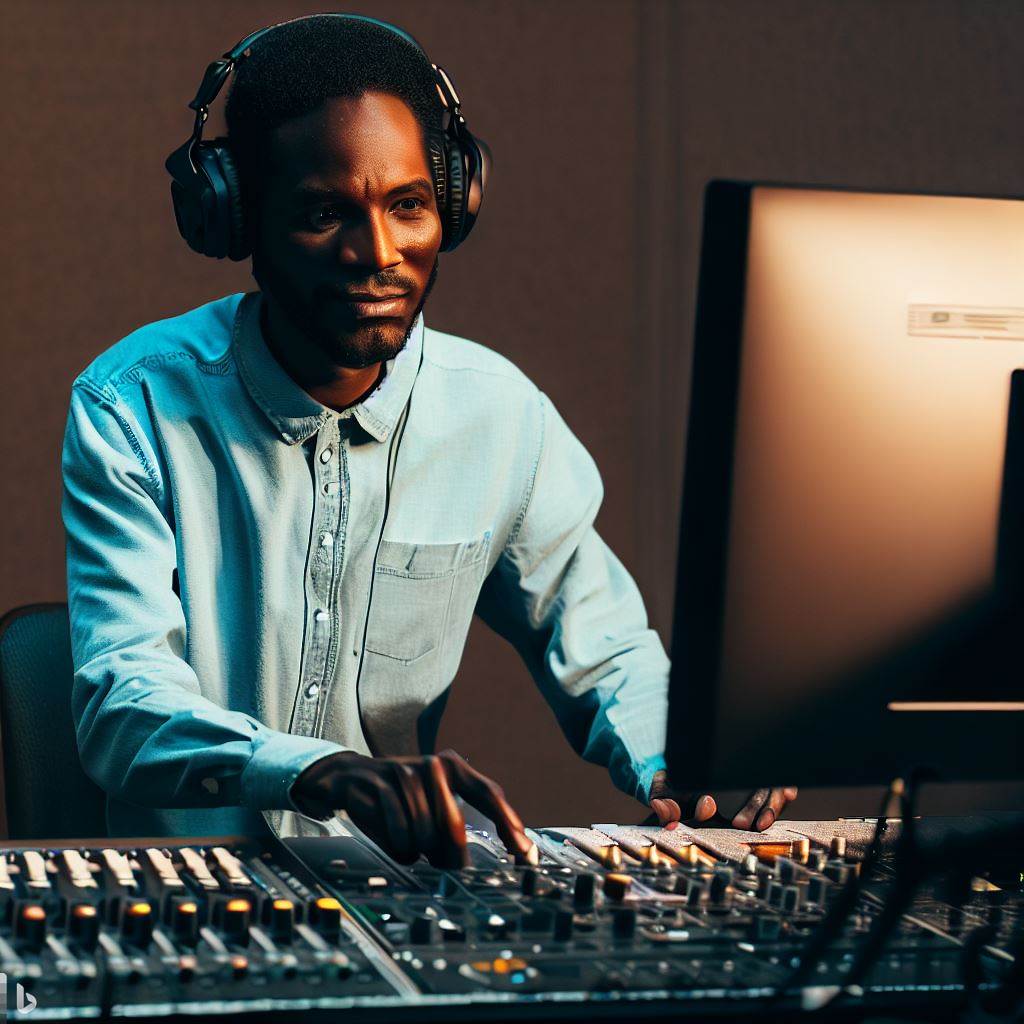Introduction
In today’s fast-paced world, journalism plays a crucial role in informing, educating, and shaping public opinion.
In Nigeria, a country known for its diverse culture and socio-political challenges, journalism holds a special significance.
Highlighting the Importance of Journalism in Nigeria
Journalism serves as the watchdog of democracy, acting as a bridge between the government and the people.
It plays a crucial role in holding those in power accountable, exposing corruption, and advocating for social justice.
Nigerian journalists face numerous challenges and risks in their day-to-day work. They strive to report unbiased news, provide insightful analysis, and give voice to the marginalized communities.
Their dedication to the truth allows citizens to make informed decisions and participate actively in the nation’s progress.
Moreover, journalism in Nigeria has the power to shape public perception, influence policy-making, and contribute to the country’s overall development.
Through investigative reporting, journalists shed light on important issues such as human rights violations, environmental concerns, and economic policies.
Additionally, journalism promotes transparency, fosters public discourse, and encourages civic engagement.
It helps in building trust between the government and its citizens, ensuring a healthy democracy.
In fact, Nigerian journalism holds immense importance in the society, serving as a catalyst for change and progress.
Despite the challenges faced by journalists, their commitment to truth-seeking and reporting has a far-reaching impact on the nation’s development and the well-being of its people.
Background on Nigerian Journalism
Delve into the world of Nigerian journalism as we uncover its vibrant history, transformative journey, and pivotal moments that have molded this industry.
Originating during the colonial era, Nigerian journalism initially served colonial interests.
Yet, as the nation’s quest for independence surged, it transformed into a powerful platform for voicing nationalist sentiments and the fight for freedom.
Post-independence, a surge in media outlets and journalism schools marked a milestone, amplifying the industry’s growth.
Throughout history, Nigerian journalists have stood as crucial players, notably during military regimes, championing press freedom and democracy, despite facing adversity.
The annulled June 12, 1993, election and its aftermath spotlighted journalism’s significance. Journalists played a pivotal role in exposing human rights abuses and amplifying citizens’ voices.
The return to democracy in 1999 ushered in new opportunities and challenges. The digital age propelled change, demanding adaptability without compromising accuracy.
Despite obstacles like fake news and censorship, Nigerian journalists remain unwavering in pursuing truth and accountability.
They have shaped influential media organizations, becoming advocates for transparency and social justice.
In today’s ever-evolving landscape, Nigerian journalism thrives, underlining its role in informing and fostering change.
Amidst adversity, Nigerian journalists stand as guardians of truth, ensuring the nation’s voices resound.
Morning routine
Life of a Nigerian Journalist begins by rising early and preparing for the day ahead. Their routine involves promptly checking their devices for urgent updates.
Remaining current on events is crucial, aiding in delivering accurate information to their audience.
Nigerian journalists comprehend the necessity of staying informed about global and national developments.
They navigate news websites, newspapers, and social media to gather the latest information.
Social media notably shapes their information-gathering, acting as a primary news source.
Platforms like Twitter, Facebook, and Instagram serve to track influencers, organizations, and news outlets.
Such platforms yield live updates and witness accounts, engaging the audience.
Engaging in relevant online groups fosters idea exchange. Information collated undergoes rigorous verification before use.
Cross-referencing facts, consulting multiple sources, and conducting interviews ensure reliability. Credibility is paramount, with unbiased reporting maintaining audience trust.
Once data is amassed and verified, journalists craft compelling stories, prioritizing essential news for audience engagement.
Collaborations with multimedia professionals aid in producing captivating content. Journalists strategize coverage based on identified news events.
Some specialize in specific beats, anticipating press engagements for exclusivity.
Equipped with tools, they venture out to gather news and report effectively. In the life of a Nigerian journalist, dedication to truth remains a guiding principle.
Research and Planning
Outline the process of researching and planning news stories
- Identify relevant news topics based on current events or trending issues.
- Conduct thorough research by gathering information from reliable sources.
- Verify the credibility of collected data through cross-referencing and fact-checking.
- Organize the obtained information to create a coherent and engaging news story.
- Create an outline or structure for the article to ensure logical flow and clarity.
- Plan the angle or perspective of the story to cater to the target audience’s interests.
- Consider the impact and importance of the news story in order to prioritize its coverage.
- Collaborate with team members, such as editors or photographers, for additional perspectives and support.
- Prepare interview questions or schedule interviews with relevant individuals for firsthand information.
- Finalize the research and planning phase by setting deadlines and allocating resources.
Sources journalists rely on for information
- Official press releases from government agencies or organizations.
- Eyewitness accounts and interviews with relevant individuals.
- Publicly available reports, studies, and research papers.
- Press conferences and briefings held by public figures.
- Information shared by experts, industry professionals, or academic sources.
- Online databases, archives, and libraries for historical context or detailed information.
- Social media platforms to gauge public opinion or find emerging trends.
- News agencies, wire services, and news websites for global or national updates.
- Collaboration with fellow journalists or colleagues for information exchange.
- Investigative journalism techniques, such as document leaks or undercover reporting.
Challenges faced in accessing reliable information
- Bias or misinformation spread through fake news websites or unverified sources.
- Government restrictions or censorship limiting the flow of information.
- Reluctance of officials or individuals to provide accurate and transparent data.
- Language barriers when researching international or non-English sources.
- Limited access to remote or conflict-affected areas, hindering firsthand reporting.
- Lack of adequate funding or resources for in-depth investigative journalism.
- Pressure and influence from external stakeholders to shape the narrative.
- Time constraints in meeting deadlines while ensuring accurate information.
- Competing with other journalists or media outlets to break news stories.
- Balancing the need for reliable information with the need to present engaging and impactful news.
Being a Nigerian journalist entails conducting thorough research, relying on diverse sources, and facing numerous challenges when accessing reliable information.
The process of researching and planning news stories involves identifying relevant topics, gathering credible information, and organizing it into a coherent narrative.
Journalists depend on sources such as press releases, interviews, public reports, and social media platforms.
However, they must navigate challenges such as misinformation, government restrictions, language barriers, and limited access to remote areas.
Despite these obstacles, journalists strive to deliver accurate and impactful news to their audience.
Fieldwork and Reporting
Gathering information and conducting interviews are crucial aspects of a Nigerian journalist’s job, requiring dedication, perseverance, and a commitment to accuracy and impartiality.
Experiences in the Field
A Nigerian journalist in the field encounters a myriad of experiences that shape their reporting.
From bustling cities to remote villages, they witness the diversity of their country firsthand.
- Interviewing Local Leaders: One day, a journalist may find themselves in a small village, sitting under a tree with local leaders, listening to their stories and concerns. These conversations provide a glimpse into the realities of rural life.
- Documenting Human Rights Issues: Another day may be spent documenting human rights abuses in conflict zones. The journalist becomes a witness to the suffering of affected communities, speaking truth to power.
- Covering Political Events: In the urban setting, a journalist attends political rallies and press conferences. They immerse themselves in the energetic atmosphere, capturing the voices of politicians and citizens alike.
Challenges Faced
Despite the excitement and importance of fieldwork, Nigerian journalists encounter various challenges in their pursuit of accurate and unbiased reporting.
- Hostility and Threats: Journalists often face hostility from those with vested interests who try to silence their voices. Threats to personal safety make their job even more daunting.
- Language Barriers: Nigeria is a multilingual country, and journalists frequently encounter language barriers, hindering effective communication and accurate reporting.
- Limited Resources: Lack of resources, such as proper equipment and funding for travel, can hinder journalists in conducting thorough investigations and covering remote areas.
- Access Restrictions: Reporting on certain issues, such as corruption or conflict, can be met with resistance and access restrictions imposed by authorities or powerful individuals.
Importance of Accuracy and Impartiality
Accurate and impartial reporting is the cornerstone of ethical journalism.
Nigerian journalists understand and prioritize the importance of these principles.
- Truthful Representation: Journalists strive to present facts objectively, avoiding bias or personal opinions. They understand that their work shapes public perception and must be based on truth.
- Building Trust with Sources: To maintain their credibility, journalists need to build trust with their sources. By providing accurate information, they foster relationships and ensure future access.
- Holding Power Accountable: The media’s role in holding individuals and institutions accountable for their actions is crucial for a healthy democracy. Accuracy and impartiality are vital in this task.
- Avoiding Sensationalism: Nigerian journalists understand that sensationalism undermines the integrity of their reporting. They strive to disseminate factual information that enriches public discourse.
In short, fieldwork and reporting are integral to the life of a Nigerian journalist. Despite challenges, journalists navigate diverse experiences while gathering information, always focusing on accuracy and impartiality.
Their work contributes to a better-informed society and upholds the principles of democracy.
Read: Bridging the Gap: Foley Artist Opportunities in Nigeria’s Music Industry

Press Conferences and Events
The life of a Nigerian journalist involves actively engaging in press conferences and events, vital for news gathering, questioning, and reporting on significant matters.
Such events offer a platform for government officials, business leaders, and key figures to communicate directly with the public. This interaction enhances transparency and governance accountability.
Nigerian journalists cover these events both physically and virtually, often through official invitations. Early arrivals allow them to set up, review briefings, and prepare queries.
Attending provides firsthand data and networking opportunities, boosting accurate reporting and trust-building. Their participation also lends credibility, ensuring balanced coverage.
However, challenges persist. Space limitations can exclude certain media outlets, and reporting restrictions hinder complete coverage.
The demanding schedule can lead to rushed reporting, and obtaining interviews might prove difficult.
Nonetheless, Nigerian journalists remain committed to their task, striving to provide comprehensive, reliable news for an informed public.
Read: Training and Qualification for Makeup Artists in Nigeria
Writing and Editing
In the fast-paced world of journalism, writing and editing news articles require careful attention to detail and effective storytelling.
Here’s a glimpse into the process:
Research and Gathering Information
- Start by researching the topic thoroughly to ensure accurate and up-to-date information.
- Explore multiple sources such as interviews, official reports, and data to gather all relevant details.
- Verify the credibility of your sources to maintain the integrity of your article.
Outlining and Organizing
- Create a clear outline that follows a logical flow of information, ensuring your article is well-structured.
- Organize your thoughts and ideas in a coherent manner to engage readers from the beginning.
- Decide on the key points and main message you want to convey to your audience.
Crafting Engaging Content
- Write a compelling headline that captures readers’ attention and gives them a reason to continue.
- Start with a strong lead, hooking the readers and making them want to delve deeper into the story.
- Use concise and straightforward language, avoiding unnecessary jargon or complicated terms.
- Break down complex ideas into easily understandable sections to maintain reader interest.
Fact-Checking and Accuracy
- Ensure that all facts, figures, and quotes are accurate by verifying information with multiple sources.
- Double-check any statistics or data you plan to use in your article to prevent misinformation.
- Quote your sources accurately, respecting their words by using proper attribution.
- Fact-checking is essential to maintain credibility and gain readers’ trust.
Editing and Revising
- Read your article several times, checking for grammar, spelling, punctuation, and structural errors.
- Eliminate any unnecessary or repetitive information to keep the article concise and engaging.
- Ensure the flow of the article is smooth, coherent, and connects all the relevant points.
- Consider seeking feedback from colleagues or editors to enhance your article further.
Effective Storytelling
In journalism, effective storytelling is crucial to engage readers and convey information impactfully:
- Use vivid and descriptive language to paint a picture in the reader’s mind.
- Incorporate real-life anecdotes or personal experiences to add a human element to the story.
- Focus on creating an emotional connection with the readers through relatable characters or situations.
- Use the inverted pyramid structure, placing the most important information at the beginning.
- Build tension or suspense to keep readers hooked and eager to continue reading.
By following these guidelines, journalists can ensure their writing resonates with readers, leaving a lasting impression.
Read: Cultural Influence on Makeup Artistry in Nigeria
Explore Further: Salary and Earning Potential of Costume Designers in Nigeria
Ethical Considerations
Nigerian journalists often face ethical challenges such as corruption, bribery, and the pressure to report biased news.
Maintaining objectivity and integrity is crucial for journalists as it ensures the credibility and trustworthiness of their work.
Journalists must strive to present accurate information and avoid personal biases or political influences.
By maintaining objectivity, journalists can provide a fair and unbiased account of events, allowing the public to form their own opinions.
Integrity is essential in journalism as it entails truthfulness, honesty, and accountability in reporting.
Without maintaining integrity, journalists risk damaging their reputation and losing the trust of their audience.
In Nigeria, journalists face numerous risks and threats while carrying out their duties.
They are often subjected to physical attacks, threats, and intimidation, especially when reporting on sensitive or controversial issues.
Political pressure and censorship pose significant challenges for journalists, particularly those who aim to expose corruption or hold those in power accountable.
The risks faced by Nigerian journalists have a chilling effect on press freedom and hinder the democratic functioning of the country.
Despite the dangers, many brave journalists continue to work tirelessly to uncover the truth and bring important issues to light.
Protection of journalists’ rights and ensuring their safety is crucial for fostering a vibrant and free press.
The media industry and government should work together to create an environment that upholds the ethical standards of journalism.
Ethical codes and guidelines must be established and enforced to promote responsible and ethical reporting practices.
Journalists themselves should also adhere to ethical principles, constantly strive for improvement, and rectify any mistakes or breaches of trust.
Supporting independent media organizations and protecting journalists’ rights is essential for a functioning democracy.
By recognizing the importance of ethics, objectivity, and integrity, Nigerian journalists can make a positive impact on society.
Read: Exploring the Role of Journalism in Nigeria’s Democracy
Impact and Significance
- Nigerian journalism plays a crucial role in shaping society and holding the government accountable.
- Journalists have contributed to uncovering corruption and promoting transparency in governance.
- Their work has led to policy changes and improvements in various sectors.
- Journalists have been instrumental in advocating for human rights and social justice.
- The Fourth Estate has the power to influence public opinion and shape the national discourse.
- Investigative journalism has exposed scandals and wrongdoings, leading to legal actions and reforms.
- The media acts as a watchdog, creating awareness and fostering informed civic participation.
- Journalists provide a platform for marginalized communities, amplifying their voices and addressing injustice.
- They document historical events and act as custodians of public memory.
- Journalists play a crucial role during elections, ensuring fair coverage and preventing voter manipulation.
Notable achievements and contributions:
- Nigerian journalists have won numerous awards for their investigative reporting and journalistic excellence.
- They have exposed corruption in high places, including government officials, leading to resignations and prosecutions.
- Journalists have successfully advocated for the rights of individuals and communities, leading to positive outcomes.
- They have played a pivotal role in promoting freedom of the press, despite facing threats and intimidation.
- Journalists have contributed to the emergence of a vibrant media landscape, with diverse opinions and perspectives.
- They have given a voice to the voiceless, shedding light on societal issues that were previously ignored.
- Journalists have facilitated dialogue and increased understanding between different ethnic and religious groups.
- They have raised awareness about environmental challenges and propelled the implementation of sustainable solutions.
- Journalists have supported the growth of democracy by ensuring transparency and accountability in the political process.
- They have fostered international collaborations and partnerships, leading to the exchange of knowledge and resources.
Challenges and changes needed for further development:
- Nigerian journalists face significant challenges, including threats, harassment, and physical attacks.
- Media organizations struggle with financial sustainability, limiting their journalistic capacity.
- The government’s regulatory framework does not always protect press freedom and can be used to suppress dissent.
- There is a need for improved training and ethical standards within the journalism profession.
- Journalists need access to information and sources to perform their duties effectively.
- The safety and security of journalists must be prioritized, and perpetrators of attacks should be held accountable.
- Collaboration between media houses and civil society can strengthen the impact and reach of journalists’ work.
- Journalists should embrace digital platforms and adapt to technological advancements to stay relevant.
- The government should enact legislation that guarantees press freedom and provides safeguards against censorship.
- Society at large needs to recognize the crucial role of the media and support independent journalism.
In general, Nigerian journalism has had a significant impact on society and governance.
Journalists have been at the forefront of exposing corruption, advocating for human rights, and fostering accountability.
Despite facing challenges, they have made notable achievements and contributions that have shaped the nation.
However, further development is needed, including addressing safety concerns, improving financial sustainability, and promoting ethical standards.
With the necessary support and changes, Nigerian journalism can continue to play a vital role in the country’s progress and development.
Publish Your Professional Profile, Business or Brand
Showcase your expertise, gain trust, and boost visibility instantly on Professions.ng.
Publish NowConclusion
Nigerian journalists play a vital role in shaping public opinion and promoting transparency. Throughout the day, they face numerous challenges and responsibilities.
From gathering news to reporting on important issues, they work tirelessly to keep the public informed.
They embody the spirit of investigative journalism, uncovering the truth and holding those in power accountable.
They bring to light societal problems, corruption, and human rights abuses. Their dedication and courage have the potential to create positive change in Nigeria.
It is important for readers to appreciate and support the work of Nigerian journalists. They provide a voice to the voiceless and shed light on issues that would otherwise remain hidden.
By consuming news responsibly and engaging with quality journalism, we can help ensure a thriving media landscape in Nigeria.
Journalism in Nigeria deserves our respect and support. By valuing independent reporting and fostering an environment of free press, we can contribute to a more transparent and accountable society.
Let us remember the sacrifices they make and continue to stand behind those who work tirelessly to bring us the news that matters.
Together, we can encourage the growth of journalism in Nigeria and make a lasting impact on the future of our nation.
Let us appreciate the role of Nigerian journalists and their commitment to upholding the principles of truth, integrity, and transparency.




